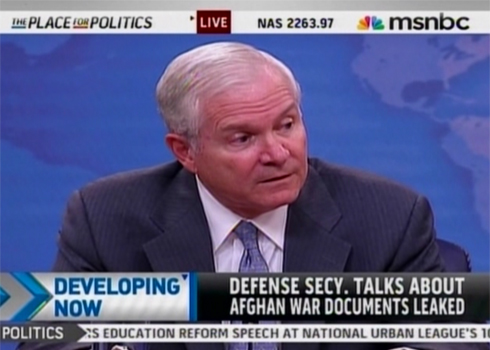Defense Secretary Robert Gates and Admiral Mike Mullen held a press conference today to address the leak of 92,000 documents about the Afghanistan War by the website Wikileaks. Gates condemned the leaks, warning “the battlefield consequences” are “potentially severe and dangerous for our troops.”
Gates said that though the documents “do not, in my view, fundamentally call into question the efficacy of our current strategy in Afghanistan and its prospects for success, the incident
is a pointed reminder that much secret information is treated as such to protect sources of information, to protect the lives of our men and women in uniform, to deny our enemies the information about our military operations, and to preserve our relationship with friends and allies.
Gates continued that “the battlefield consequences of the release of these documents are potentially severe and dangerous for our troops, our allies and Afghan partners, and may well damage our relationships in that key part of the world.”
He added that the Defense Department is conducting a “thorough” investigation into how the leak occurred. “We have a moral responsibility,” said Gates, to “mitigate the consequences.”
Mullen described the “recklessness” of the leaks, and said that he is “appalled” and:
frankly outraged that anyone in their right mind would think it valuable to make public even one sensitive report, let alone tens of thousands of them about a war that is being waged.
Mullen continued that Wikileaks founder Julian Assange “can say whatever he likes about the greater good he and his source are doing, but the truth is they might already have on their hands the blood of some young soldier.”
In the Q&A session afterward, Gates said that as far as he knows, there’s been no attempt to reach out to Assange to find out what other documents he has. “I’m not sure why we would,” Gates said. “You think he’s going to tell us the truth?”
He also said he does not know whether criminal charges will be filed against Assange.






